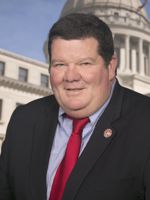Mississippi lawmakers will look to address the state’s certificate of need laws this legislative session as a solution to ongoing healthcare concerns.
With Medicaid expansion failing to reach the end zone last year and an incoming administration change at the federal level, efforts to expand access to insurance for the working poor in the Magnolia State could be paused until it is clear how Donald Trump and his cabinet will tackle healthcare policy.
Much to the satisfaction of Republican Gov. Tate Reeves, a staunch opponent of Medicaid expansion, legislators may instead pivot their focus to reforming certificate of need laws — colloquially known as CON laws.
Though a plethora of elected officials, particularly from the Republican Party, have routinely criticized Mississippi’s CON laws, wide-scale reform has not yet come to fruition, despite the GOP holding a supermajority in the state legislature. State Rep. Sam Creekmore, who chairs the House Public Health and Human Services Committee, is looking to change that this year.
Creekmore is preparing to bring a “common sense” proposal to the House floor that would free up hospitals and other healthcare providers to make decisions without government oversight.

You may be asking, “What are CON laws?”
CON laws originated at the state level in New York in 1964 and were federally mandated in 1974 to lower healthcare costs and prevent unnecessary duplication of services. The regulations require healthcare providers to seek the government’s approval for certain projects and capital expenditures — money spent to acquire or maintain fixed assets like land, buildings, and equipment.
In 1987, Congress repealed the federal mandate, allowing each state to determine its own CON policies. Since then, 15 states have done away with these laws while 35 others — including Mississippi — have kept them intact, though modifications and scalebacks of the regulations have been executed in a multitude of states.
Currently, medical entities in Mississippi are required to submit a CON application to the Department of Health to add hospital beds, purchase medical equipment, and even more importantly, add in-house dialysis centers. This process, per Rep. Creekmore, can be quite lengthy and expensive while simultaneously stifling the free market.
“We’re not going to hurt anybody. This takes some things off that need to be off to encourage competition and save money,” the Creekmore said. “It’s an expensive process. You hire an attorney. They fill out the forms, then the Department of Health requires a fee.”
One specific reform Creemore is vying for is allowing hospitals to circumvent CONs in efforts to provide outpatient dialysis services. This would allow patients not staying overnight to receive services from the hospital they visit without having to be transferred to another facility.
The Republican from New Albany contends that this could open up a new revenue stream for rural hospitals in need of aid while also expanding access to care for Mississippians.
“Hospitals can do inpatient dialysis, but they can’t do outpatient dialysis, because that’s a separate CON process. What I would like to see is that lifted for hospitals only,” he continued. “If they could provide outpatient dialysis, that could, one, give them another revenue stream, and two, give our people in the state of Mississippi who need that treatment another option.”
Last year, legislation that would have revised CON laws passed in the House but did not make much headway in the Senate. Between the last session and the current one, Creekmore has talked with Senate Public Health and Welfare Committee Chairman Hob Bryan in an effort to get the two chambers on the same page.
In his pursuit to alter Mississippi’s CON laws, Creekmore maintains that he is not looking to abolish them altogether. Understanding how fragile healthcare is in rural areas of the state, particularly the Delta, the lawmaker is fine with keeping certain protections for hospitals intact for the foreseeable future.
“I do believe in some areas in the state of Mississippi, it helps, especially in the rural areas,” Creekmore said. “In our rural areas, CONs do protect our hospitals from competition coming in. Because their margins are so low — many of them are operating at a loss — so I’m not asking to lift CONs for hospitals, at least not right now.”
The proposal espoused by Creekmore aligns with Reeves’ and House Speaker Jason White’s agendas.








